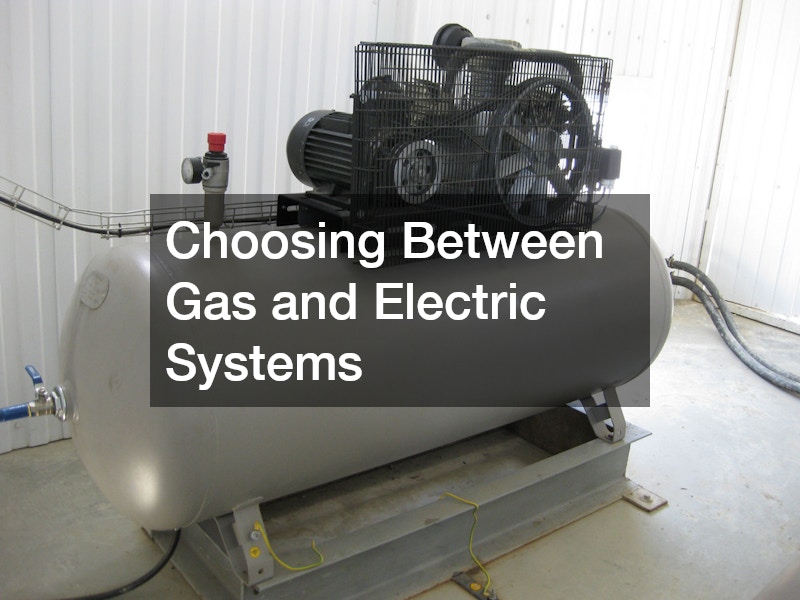When it comes to maintaining a comfortable living environment, having a reliable heating, ventilation, and air conditioning (HVAC) system is crucial. Whether you’re looking to upgrade your current system or install a new one, it’s essential to understand the various factors involved in choosing the right HVAC system for your home. In this comprehensive guide, we will explore everything from assessing your home’s heating and cooling needs to understanding different HVAC system types, energy efficiency ratings, and more. By the end of this article, you’ll have the knowledge and expertise to make an informed decision regarding your HVAC system.
Assessing Your Home’s Heating and Cooling Needs

When it comes to evaluating your home’s heating and cooling needs, it’s important to consider factors such as the size of your home, insulation levels, and climate conditions. Consulting a local HVAC contractor can provide valuable insights into the specific requirements of your property. By conducting a thorough assessment, you can determine the optimal HVAC system that will efficiently regulate temperature and humidity levels in your home.
Additionally, taking into account any existing issues with your current system can help identify areas that need improvement. A professional evaluation can reveal hidden problems that may be impacting your system’s performance, allowing for targeted solutions to enhance overall efficiency and comfort.
By seeking HVAC advice from a reputable HVAC contractor, you can access expert recommendations tailored to your unique needs. Whether it’s addressing ventilation issues, updating outdated equipment, or exploring energy-efficient options, professional guidance can streamline the decision-making process and ensure long-term satisfaction with your HVAC system.
Understanding HVAC System Types
When it comes to selecting an HVAC system for your home, understanding the different types available is essential. From central air conditioning systems to heat pumps and ductless mini-split systems, each option has its own set of advantages and limitations. Local HVAC repairs can provide valuable insights into the most suitable system for your specific requirements.
By considering factors such as your home’s layout, budget, and energy efficiency goals, you can narrow down the options that align with your priorities. HVAC advice from industry professionals can help you navigate the complexities of various system types, ensuring that you make an informed decision that meets your heating and cooling needs.
Exploring the benefits of different HVAC system types can also shed light on innovative features that enhance comfort and convenience in your home. Whether it’s zone-controlled heating, smart thermostats, or advanced filtration systems, understanding the unique capabilities of each system can help you make a well-informed choice.
Energy Efficiency Ratings
When it comes to selecting an HVAC system for your home, energy efficiency is a critical factor to consider. HVAC supply stores offer a range of high-efficiency options that can lower your utility bills and reduce your environmental impact. Understanding energy efficiency ratings can help you select a system that maximizes performance while minimizing energy consumption.
Consulting with HVAC professionals can provide insights into the latest advancements in energy-efficient systems, from variable-speed compressors to programmable thermostats. By investing in a high-efficiency HVAC system, you can enjoy long-term savings on your heating and cooling costs while maintaining a comfortable indoor environment.
Choosing an energy-efficient HVAC system not only benefits your wallet but also contributes to a sustainable future. By reducing your carbon footprint with this HVAC adviceand conserving energy resources, you can make a positive impact on the environment while enjoying the comfort and convenience of a smart HVAC system.
Choosing Between Gas and Electric Systems

When it comes to selecting a heating system for your home, the choice between gas and electric systems can be a significant decision. HVAC companies can offer guidance on the advantages and disadvantages of each option, helping you make an informed choice based on your preferences and budget. Local HVAC companies can provide installation services for both gas and electric systems, ensuring a seamless transition to a new heating solution.
While gas systems are known for their efficiency and cost-effectiveness, electric systems offer simplicity and reliability in operation. By evaluating your heating needs and considering factors such as energy prices and availability, you can choose the system that best suits your home and lifestyle. HVAC advice from professionals can clarify the differences between gas and electric systems, empowering you to make a confident decision.
Ultimately, the choice between gas and electric systems comes down to personal preference and practical considerations. By weighing the pros and cons of each option and consulting with HVAC experts, you can select a heating system that meets your specific requirements and delivers consistent performance throughout the year.
The Benefits of Smart HVAC Systems
As technology continues to advance, smart HVAC systems are becoming increasingly popular for homeowners seeking enhanced comfort and convenience. HVAC service providers can install and maintain smart thermostats, air purifiers, and other intelligent devices that optimize your indoor environment. By incorporating smart technology into your HVAC system, you can enjoy automated temperature control, energy savings, and improved air quality.
Smart HVAC systems also offer remote access and monitoring capabilities, allowing you to adjust settings and monitor performance from anywhere at any time. HVAC advice from professionals can help you navigate the features and benefits of smart systems, ensuring that you maximize the potential of your investment. With tailored recommendations and expert installation services, you can seamlessly integrate smart technology into your home’s heating and cooling infrastructure.
In addition to enhancing comfort and energy efficiency, smart HVAC systems can provide valuable insights into your home’s indoor air quality and energy usage. By leveraging the power of data analytics and automation, you can optimize system performance, identify potential issues, and proactively address maintenance needs. With a smart HVAC system, you can enjoy peace of mind knowing that your home is always comfortable, healthy, and efficient.
Ductwork Considerations
When installing or upgrading an HVAC system, ductwork considerations play a crucial role in ensuring optimal performance and efficiency. Local HVAC companies can assess your existing ductwork for leaks, insulation, and airflow obstructions, identifying areas that may require repair or replacement. By addressing ductwork issues upfront, you can prevent energy loss, uneven heating or cooling, and other common problems that impact system performance.
Proper ductwork design and installation are essential for maintaining consistent airflow throughout your home and maximizing the efficiency of your HVAC system. HVAC advice from professionals can guide you through ductwork considerations, such as duct size, insulation material, and layout optimization, to achieve the desired comfort levels in every room. By investing in quality ductwork solutions, you can enhance the overall performance and longevity of your HVAC system.
Incorporating ductwork considerations into your HVAC system design can improve air quality, reduce energy waste, and prolong the life of your heating and cooling equipment. With expert guidance from local HVAC contractors, you can address ductwork challenges effectively, ensuring that your home remains comfortable, efficient, and well-ventilated year-round.
Exploring Ductless Mini-Split Systems

For homeowners seeking a versatile and space-saving heating and cooling solution, ductless mini-split systems offer a compelling alternative to traditional HVAC systems. Best air conditioning contractors can install and maintain ductless mini-split systems that provide zoned heating and cooling capabilities without the need for extensive ductwork. By exploring ductless mini-split systems, you can enjoy customized comfort in different areas of your home while maximizing energy efficiency and cost savings.
Ductless mini-split systems consist of indoor air handlers connected to an outdoor condenser unit, allowing for independent temperature control in specific zones or rooms. HVAC advice from professionals can highlight the benefits of ductless systems, such as easier installation, improved energy efficiency, and enhanced flexibility in heating and cooling settings. By embracing ductless technology, you can tailor your indoor environment to suit individual preferences and optimize energy usage.
Whether you’re renovating your home, expanding living spaces, or looking to supplement your existing HVAC system, ductless mini-split systems offer a practical and versatile solution. By partnering with experienced HVAC contractors, you can explore the full potential of ductless technology and create a comfortable, energy-efficient environment in your home.
Budgeting for Your HVAC System
When planning for a new HVAC system installation, budgeting is a critical step in ensuring a smooth and successful transition. HVAC installation costs can vary depending on the type of system, size of your home, and additional features or upgrades you choose. By consulting with HVAC supply stores and receiving quotes from multiple contractors, you can develop a comprehensive budget that covers all aspects of your HVAC project.
Consideration should be given to factors such as equipment costs, installation fees, permit expenses, and ongoing maintenance requirements when budgeting for your HVAC system. HVAC advice from professionals can help you prioritize spending and make informed decisions that align with your financial goals and long-term comfort needs. By establishing a realistic budget upfront, you can avoid unexpected costs and ensure a successful HVAC installation process.
While upfront costs are a critical consideration, it’s also important to factor in long-term savings and benefits associated with energy-efficient HVAC systems. By investing in a high-quality system that meets your needs and budget, you can enjoy lower utility bills, improved comfort, and increased property value over time. With careful planning and expert guidance, you can make a sound investment in your home’s heating and cooling infrastructure.
Seeking Professional Guidance
When it comes to selecting, installing, or maintaining an HVAC system, seeking professional guidance is essential for achieving optimal performance and efficiency. Heating repair specialists can diagnose and resolve issues with your existing system, ensuring that it operates safely and reliably throughout the year. By partnering with experienced HVAC service providers, you can access expert advice, quality workmanship, and reliable support for all your heating and cooling needs.
Whether you’re considering upgrading to a smart HVAC system, repairing a malfunctioning unit, or scheduling routine maintenance, HVAC advice from professionals can streamline the process and deliver long-lasting results. Professional guidance can help you navigate complex system requirements, code compliance, and industry best practices, ensuring that your HVAC system performs at its best in any season. By entrusting your HVAC needs to qualified experts, you can enjoy peace of mind knowing that your home’s comfort and safety are in good hands.
In addition to technical expertise, HVAC professionals can provide recommendations on energy-saving strategies, humidity control solutions, and indoor air quality enhancements. By leveraging their knowledge and skills, you can optimize your HVAC system’s performance, reduce energy costs, and extend its lifespan. With proactive maintenance and professional guidance, you can benefit from a safe, efficient, and reliable HVAC system for years to come.
Maintenance and Longevity
Regular maintenance is essential for preserving the performance and longevity of your HVAC system. Heat pump specialists recommend scheduling annual tune-ups and inspections to prevent breakdowns, improve efficiency, and extend the lifespan of your equipment. By investing in routine maintenance services, you can detect and address minor issues before they escalate into costly repairs, ensuring that your HVAC system operates smoothly and efficiently year-round.
HVAC advice from maintenance professionals can provide insights into the best practices for caring for your system, such as changing air filters, cleaning vents, and adjusting thermostat settings. By following a maintenance schedule and addressing maintenance tasks promptly, you can maximize the efficiency, lifespan, and reliability of your HVAC system. With proactive care and attention to detail, you can enjoy consistent comfort and performance from your heating and cooling equipment.
Along with routine maintenance, it’s important to address any repair needs promptly to prevent further damage and preserve the integrity of your HVAC system. By partnering with heating repair experts, you can address issues such as faulty components, refrigerant leaks, or airflow restrictions with precision and efficiency. With timely repairs and proactive maintenance, you can ensure that your HVAC system remains in top condition and delivers optimal comfort and energy efficiency for years to come.
Making the Final Decision

After considering all factors, options, and expert advice, making the final decision on your HVAC system requires careful deliberation and confidence in your choice. Whether you opt for a traditional central air system, a high-efficiency heat pump, or a cutting-edge smart HVAC solution, ensure that the system aligns with your budget, performance expectations, and long-term comfort goals. By evaluating all aspects of the decision-making process, you can select an HVAC system that meets your needs and exceeds your expectations.
Selecting the right HVAC system for your home involves a careful evaluation of various factors, from assessing heating and cooling needs to considering energy efficiency ratings, system types, and maintenance requirements. By seeking professional guidance and incorporating expert advice into your decision-making process, you can make an informed choice that enhances comfort, efficiency, and indoor air quality in your home. Whether you’re upgrading an existing system or installing a new one, investing in a reliable HVAC system can transform your living environment and elevate your quality of life. With the HVAC advice gained from this guide, you can confidently navigate the complexities of HVAC systems and create a comfortable, energy-efficient home.